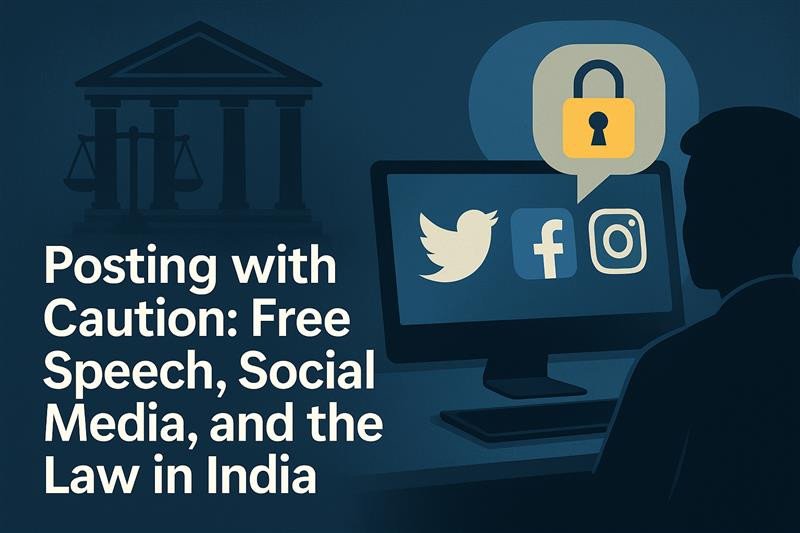Posting with Caution: Free Speech, Social Media, and the Law in India
- Sangna kansagra & Leya Susan Binu
In an age where a single post can go viral in seconds, social media is both a megaphone for free speech and a minefield of legal risk. While freedom of speech is a cornerstone of democratic societies, it's also one of the most misunderstood rights—especially online.
In light of recent online activity related to heightened political tensions, it is more important than ever to understand what you can—and cannot—legally say online, how platforms handle speech, and how to protect your digital presence.
Understanding Free Speech: What the Law Really Says
The Constitution of India guarantees the right to freedom of speech and expression under Article 19(1)(a). However, this right is not absolute. Article 19(2) permits the state to impose reasonable restrictions in the interests of:
- Sovereignty and integrity of India
- Security of the state
- Public order
- Decency or morality
- Contempt of court
- Defamation
- Incitement to an offence
How Social Media Platforms Govern Speech
Even if your post is lawful under national law, social media platforms apply their own rules:
- Community Guidelines of platforms like X (Twitter), Meta (Facebook/Instagram), and YouTube prohibit hate speech, misinformation, threats, and glorification of violence.
- Platforms are increasingly required to comply with local laws, such as India’s IT Rules, 2021, which mandate content takedown within hours of notice.
- Repeat violations can result in account suspension or permanent bans—sometimes without prior warning.
- Shadow banning / algorithmic suppression
- No “right to be heard” on private platforms
Note: Platforms are private entities—they are not bound by constitutional free speech rights but enforce their own Terms of Service, which users agree to.
Government Advisories and Legal Framework
1. Advisory Against Live Coverage of Defence Operations
In response to escalating tensions, the Ministry of Defence issued an advisory urging media outlets and individuals to refrain from live coverage or real-time reporting of defence operations and movements of security forces. The advisory emphasizes that premature disclosure of sensitive information could compromise operational effectiveness and endanger lives. This directive aligns with Clause 6(1)(p) of the Cable Television Networks (Amendment) Rules, 2021, which prohibits live broadcasts of anti-terrorist operations and allows updates only through authorized government officers.
2. Advisory to OTT Platforms
The Ministry of Information and Broadcasting has advised OTT platforms to immediately discontinue content originating from such Countries. This measure aims to curb potential dissemination of misinformation or propaganda that could threaten national security.
3. Combating Misinformation: The Role of Fact-Checking
The Press Information Bureau's (PIB) fact-checking unit has been actively debunking false claims circulating on social media. Notably, the PIB has flagged numerous combat gaming videos being falsely presented as authentic footage. Such deceptive content contributes to misinformation and can escalate tensions. Citizens are urged to verify content before sharing and rely on official sources for accurate updates.
Know Your Rights as a Digital Citizen
While posting online, remember your rights come with responsibilities.
- Right to Appeal Content Removal
Platforms provide users a mechanism to appeal content takedowns or bans.
- Right to Appeal Content Removal
- Right to Legal Counsel
If served a notice or FIR for online speech, you are entitled to representation and a fair legal process.
- Right to Legal Counsel
- Right to Privacy & Anonymity
While anonymity online is not always protected, data collection and surveillance are subject to procedural safeguards.
- Right to Privacy & Anonymity
- Right to Information
Government orders for content takedown (especially in India) may be challenged via RTI or judicial review.
- Right to Information
Responsible Expression: Practical Guidance
While the law protects your right to speak, it expects you to exercise it responsibly.
To navigate the digital landscape responsibly:
- Verify Before Sharing: Cross-check information with credible sources.
- Be Cautious with Visual Content: Avoid sharing unverified images or videos, especially those depicting violence or operations.
- Respect Legal Boundaries: Refrain from posting content that could be construed as defamatory, inciting, or threatening to public order.
- Report Misinformation: Utilize official channels to report false information.
- Protect Personal Information: Be wary of unsolicited communications and avoid sharing sensitive personal data online.
- Use disclaimers where appropriate.
- Avoid speculation during sensitive national events.
For Professionals, Journalists, and Students
If your role involves commentary or reporting, the bar for responsibility is even higher.
- Maintain Neutrality: Avoid emotionally charged language during sensitive events.
- Cite Credible Sources: Especially when dealing with political or legal issues.
- Don’t Violate Confidentiality: Respect NDAs, court orders, and ministry advisories.
- Use Disclaimers: “Views expressed are personal” where appropriate.
- Follow Sector Guidelines: Journalists should adhere to Press Council norms; students to university speech codes.
Conclusion: Awareness over Outrage
Awareness is not censorship—it’s protection.
As the lines between the digital and real worlds continue to blur, understanding your rights and limits is essential. In times of national or global tension, your posts don’t just reflect your opinion—they can have real-world legal, ethical, and societal consequences.
Being informed doesn’t mean staying silent. It means knowing when to speak, how to speak, and what the consequences may be.
